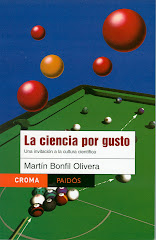Published on Milenio Diario, February 25, 2009
 The economy is a Darwinian system. But when neoliberal economists talk about the "principles of the free market" like as if these were natural laws, they forget that the economy is not a natural system, but a human one; therefore, it should be subject to ethics.
The economy is a Darwinian system. But when neoliberal economists talk about the "principles of the free market" like as if these were natural laws, they forget that the economy is not a natural system, but a human one; therefore, it should be subject to ethics.A clear case is the crisis that currently affects science journalism. Journalism, apart from being a business, has a social function that is fundamental for a democracy, and which gives it sense: to give the citizens information that allows them to form their opinions and take decisions (if not, it's better to sell doughnuts, a much simpler and secure business).
In particular, science journalism democratizes science and allows common citizens, not only business people and scientists, to participate of the discoveries and to be involved in decisions that might have grave social and environment effects.
But the economic crisis has caused numerous media in the world to reduce the spaces they devote to science. One of the most notable cases is CNN, which last December cut the entire staff (seven people) of their science, technology and environment department.
In México, last week Reforma, one of the country's major newspapers, decided to eliminate its science printed pages. They will not fire their reporters, and they assure (just like CNN) that science stories will continue to appear, distributed in other sections of the newspaper, but the "high price of paper" forced them to make the cuts.
Reforma had already cancelled its excellent book supplement, Hoja por hoja. In times of crisis, science —and culture— still don't matter. Unfortunately, the media lack a scientific perspective: in the short term, cuts can be justified; in the long term, only a scientific and technical culture in all citizens can save the country from recurrent economical crises. Bad news. What a shame.
(translated by Adrián Robles Benavides)
To receive Science for pleasure weekly
in your email, subscribe here!






